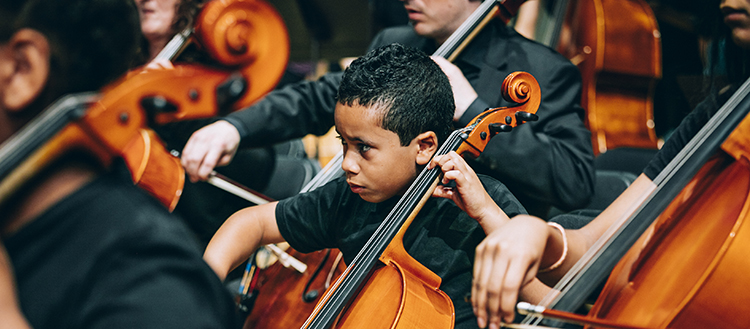Integrate an orchestra increases capabilities cognitive
The EmoDémos project – led by the University of Geneva among children aged 7 to 12 years – has shown that playing an instrument in an orchestra can facilitate the acquisition of cognitive and emotional skills in two years.

Pupils participating in the EmoDémos project, which aims to open the doors of classical music to children aged 7 to 12 living in urban policy neighbourhoods (QPV) or in rural revitalisation areas (ZRR) far from places of practice in France. © Romain Bassenne
Does being part of an orchestra from a very early age have an impact on cognitive and emotional capacities? The Cité de la musique – Philharmonie de Paris set about answering this question by commissioning researchers from the University of Geneva (UNIGE), Switzerland, the Institut de Recherche et Coordination Acoustique/Musique de Paris (IRCAM), France, and the University of Genoa, Italy. The researchers were tasked with undertaking a two-year study into the development and evolution of the cognitive and social skills of 300 children aged 7 to 12 years living in disadvantaged urban areas or disadvantaged rural areas at some distance from the usual places where classical music is taught and practiced in France. The results, which will be published in the book Together in Music: Participation, Coordination, and Creativity in Ensembles (Oxford University Press), reveal that after two years of playing music as part of a group, the memory, cognitive flexibility, autonomy and empathy of the children improved at a higher rate – five times higher – than the published measurements on standard tests.
The Cité de la musique – Philharmonie de Paris has been heading the Démos project since 2010, with the aim of opening up the world of classical music to children aged 7 to 12, living in disadvantaged urban areas (“QPV”) or disadvantaged rural areas (“ZRR”), at some distance from the usual places where classical music is taught and practiced. Today, more than 40 orchestras of about 100 children have already been successfully created. But apart from acquiring musical skills, does playing in an orchestra have an influence on the other abilities of these children?
UNIGE’s Swiss Centre for Affective Sciences (CISA), working in collaboration with IRCAM, was commissioned to study the evolution of the cognitive and emotional capabilities of these apprentice musicians. “Our goal was to develop scientific assessment tools that could subsequently be passed on to practitioners – the music teachers and educators taking part in the project – based on the principle of participatory science”, explains Donald Glowinski, a CISA researcher and director of the EmoDémos project.
Two-year project involving 300 children
The researchers followed 300 children over two years in three orchestras with different levels: beginner, intermediate and advanced. “Our research focused on several cognitive and motor aspects that are linked to the development of empathy and sociability, two aptitudes that are hard to measure directly without introducing biases”, continues the Geneva-based researcher. “In fact, the problem with empathy is recognising the emotions of others without confusing them with your own”, says Didier Grandjean, a professor in the Psychology Section at UNIGE. “It’s about putting yourself in the shoes of the other person, interpreting their reaction and synchronising your own reaction with theirs.”
The researchers carried out three types of test to measure the evolution of the cognitive and emotional skills of the young musicians. The first test was a general questionnaire about their relations with others, work and the Démos project itself. The second test focused on tablet-based games aimed at measuring working memory (how much information a child can retain), emotions (understanding a situation and choosing the appropriate emotion to respond to it), the attention process and cognitive flexibility (integrating instructions, acting accordingly and adapting quickly to changes in rules). For the third test, the researchers developed interactive applications to measure the precision and synchronisation of the movement of apprentice musicians tasked with emulating their music teacher or other children.
Overall improvement in cognitive and emotional skills
From the first year with the orchestra, the researchers observed a significant change in the development of the cognitive and emotional capacities of the children in the orchestras in comparison with published results. “But it was between the second and third year in particular that the results were the most astonishing: memory, emotional recognition and cognitive flexibility improved greatly and were close to being multiplied by five in a child aged 9 years in the orchestra”, enthuses Glowinski. The results also correlate with the feedback from the teachers and educators about their perceptions of the children’s development, which also reflected huge progress over the years. “Science and intuition come together here”, emphasises professor Grandjean.
In this way EmoDémos has contributed original information about the impact of orchestral music on the brain, creating a link between the children and the creation of coordination and synchronisation between them. The participatory methodology, designed in close collaboration with the educators in the field, has made it possible to devise new tools to study the effects of playing music. “Thanks to the Démos project, these children have gained autonomy and listening skills and have learned to live together based on a joint classical music project”, concludes Glowinski.
